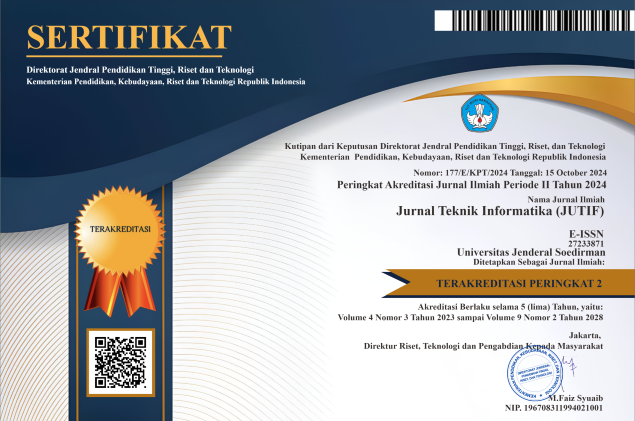ANALYSIS AND IMPLEMENTATION OF SENTIMENT SYSTEM ON THE ELECTABILITY OF INDONESIAN PRESIDENTIAL CANDIDATES 2024 USING SUPPORT VECTOR MACHINE METHOD
DOI:
https://doi.org/10.52436/1.jutif.2024.5.4.2029Keywords:
Election, Presidential Candidates, Sentiment Analysis, Support Vector MachineAbstract
Indonesia is a country that implements democracy in choosing presidential candidates through the election process. People have their own views on the presidential candidates they support, and in this digital era, social media is the main platform for people to express their opinions. Public opinion can be positive or negative, public opinion, hate speech, and various other comments that can cause hostility, insults, debates, and disputes. In this study, data modeling using the Support Vector Machine (SVM) method will be evaluated using a confusion matrix. The data used for anies data is 1607 tweets, prabowo data is 1761 tweets, and ganjar data is 1607 tweets with the keywords “anies baswedan”, “prabowo subianto”, and “ganjar pranowo” with the data collection period from November - December 2023. The results of this study show that the sentiment classification model has good performance. For Anies Baswedan data, the SVM model achieved accuracy of 86.64%, precision of 86.69%, recall of 86.64%, and f1-score of 86.62%. For Prabowo Subianto data, the model achieved an accuracy of 90.65%, precision of 90.81%, recall of 90.65%, and f1-score of 90.61%. Meanwhile, for Ganjar Pranowo data, the model achieved an accuracy of 93.78%, precision of 93.67%, recall of 93.78%, and f1-score of 93.72%. These results show that the system is able to classify people's sentiment.
Downloads
References
T. R. Putra and A. Nurcholis, “Pengaruh Media Sosial terhadap Partisipasi Pemilih Pemula pada Pemilihan Presiden 2019: Studi pada Mahasiswa FISIPOL UGM,” J. PolGov, vol. 2, no. 1, 2020, doi: 10.22146/polgov.v2i1.1372.
LSI, “Rilis Survei Nasional Isu-Isu Nasional Dan Peta Kompetisi Pilpres & Pileg,” Lemb. Surv. Indones., no. 40, pp. 3–9, 2023.
Saiful Mujani Research & Consulting (SMRC), Trend Dukungan Kepada Bakal Calon Presiden. 2023.
P. Opinion, “INDONESIA Peta Elektabilitas Koalisi , Capres,” 2024.
A. Setiaman and S. A. Girsang, “Elektabilitas Calon Presiden: Realitas Atau Penggiringan Opini?,” J. Kaji. Budaya dan Hum., vol. 5, no. 2, pp. 221–227, 2023, doi: 10.61296/jkbh.v5i2.148.
M. R. Fais Sya’ bani, U. Enri, and T. N. Padilah, “Analisis Sentimen Terhadap Bakal Calon Presiden 2024 Dengan Algoritme Naïve Bayes,” JURIKOM (Jurnal Ris. Komputer), vol. 9, no. 2, p. 265, 2022, doi: 10.30865/jurikom.v9i2.3989.
M. Rizki, M. F. Hidayattullah, and D. Intan, “Klasifikasi Opini Publik di Twitter Terhadap Bakal Calon Presiden Indonesia Tahun 2024 Menggunakan LSTM Secara Realtime Berbasis Website,” vol. 14, no. 02, pp. 286–294, 2024, doi: 10.35970/infotekmesin.v14i2.1908.
D. R. Manalu, M. C. L. Tobing, and M. Yohanna, “Analisis Sentimen Twitter Terhadap Wacana Penundaan Pemilu Dengan Metode Support Vector Machine,” METHOMIKA J. Manaj. Inform. dan Komputerisasi Akunt., vol. 6, no. 6, pp. 149–156, 2022, doi: 10.46880/jmika.vol6no2.pp149-156.
R. Tineges, A. Triayudi, and I. D. Sholihati, “Analisis Sentimen Terhadap Layanan Indihome Berdasarkan Twitter Dengan Metode Klasifikasi Support Vector Machine (SVM),” J. Media Inform. Budidarma, vol. 4, no. 3, p. 650, 2020, doi: 10.30865/mib.v4i3.2181.
A. P. Natasuwarna, “Seleksi Fitur Support Vector Machine pada Analisis Sentimen Keberlanjutan Pembelajaran Daring,” Techno.Com, vol. 19, no. 4, pp. 437–448, 2020, doi: 10.33633/tc.v19i4.4044.
H. P. P. Zuriel and A. Fahrurozi, “Implementasi Algoritma Klasifikasi Support Vector Machine Untuk Analisa Sentimen Pengguna Twitter Terhadap Kebijakan Psbb,” J. Ilm. Inform. Komput., vol. 26, no. 2, pp. 149–162, 2021, doi: 10.35760/ik.2021.v26i2.4289.
C. Shofiya and S. Abidi, “Sentiment analysis on covid-19-related social distancing in Canada using twitter data,” Int. J. Environ. Res. Public Health, vol. 18, no. 11, 2021, doi: 10.3390/ijerph18115993.
Z. Alhaq, A. Mustopa, S. Mulyatun, and J. D. Santoso, “Penerapan Metode Support Vector Machine Untuk Analisis Sentimen Pengguna Twitter,” J. Inf. Syst. Manag., vol. 3, no. 2, pp. 44–49, 2021, doi: 10.24076/joism.2021v3i2.558.
S. Sumayah, F. Sembiring, and W. Jatmiko, “Analysis of Sentiment of Indonesian Community on Metaverse Using Support Vector Machine Algorithm,” J. Tek. Inform., vol. 4, no. 1, pp. 143–150, 2023, doi: 10.52436/1.jutif.2023.4.1.417.
M. R. Arjunanto and S. Waluyo, “Analisis Sentimen Pada Media Sosial Twitter Terhadap Infrastruktur Jalan Di Lampung Menggunakan Algoritma K-Nearest Neighbor,” Pros. Semin. Nas. …, vol. 2, no. September, pp. 810–817, 2023.
D. Septiani and I. Isabela, “Analisis Term Frequency Inverse Document Frequency (Tf-Idf) Dalam Temu Kembali Informasi Pada Dokumen Teks,” SINTESIA J. Sist. dan Teknol. Inf. Indones., vol. 1, no. 2, pp. 81–88, 2022.
R. F. Ananda, A. Syahri, and F. N. Hasan, “Sentiment Analysis of Customer Satisfaction in Gojek and Grab Application Reviews Using the Naive Bayes Algorithm,” JUTIF J. Tek. Inform., vol. 5, no. 1, pp. 233–241, 2024.



























